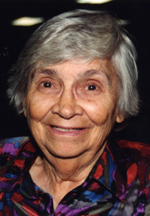 |
It is the sad passing of an era: Supreme Court litigant and First Amendment heroine Vashti Cromwell McCollum, 93, died on Aug. 20, in a nursing home in Champaign, Ill. Vashti, whose mind was sharp to the end, had recently moved into an assisted living facility.
Vashti was an honorary officer of the Freedom From Religion Foundation, and is featured in “Champions of the First Amendment,” a film by the Foundation, which will soon be re-released in DVD format.
Vashti became “a very unpopular woman,” as she put it, for taking and winning the first case before the U.S. Supreme Court to halt religious instruction in the public schools. McCollum v. Board of Education, 333 U.S. 203 212 (1948) is the lynchpin of Establishment Clause law keeping religion out of public schools.
Vashti’s death received a 38-column-inch obituary in The New York Times (Aug. 26, 2006), and was covered by The Los Angeles Times and British newspapers.
Vashti’s memorably-written account of what turned into an ordeal remains one of the most readable testaments to the personal toll exacted when the wall of separation between church and state is violated, especially at the expense of schoolchildren and their parents. One Woman’s Fight, first published in 1951, has been kept in print by the Freedom From Religion Foundation, which has published an updated version with family photographs from the era.
Vashti Cromwell was born in Lyons, N.Y., on Nov. 6, 1912. Her father, Arthur G. Cromwell, an architect, was an active atheist, and president of the Rochester Society of Free Thinkers. Vashti, who grew up in Rochester, went to Cornell on a scholarship, then transferred to the University of Illinois, majoring in political science. She married John Paschal McCollum, a professor in the horticultural department, in 1933, and they had three sons.
Vashti’s idyllic life as part of a faculty family in Champaign, Ill., changed radically when their oldest boy, Jim, entered the fourth grade, and was pressured to participate in religious instruction. When she withdrew Jim from the class, he was put in what amounted to detention. After filing suit to stop the unconstitutional instruction, Vashti lost her job at the university. She was branded “that awful McCollum woman” and their family became community pariahs. Her father, during the trial, shocked the courtroom when he said he did not believe in a god. Despite losing at both trial and appellate level, Vashti did not give up. On March 8, 1948, the U.S. Supreme Court, in a decision delivered by Justice Hugo Black, vindicated Vashti and the Constitution in a ringing, precedent-making 8-1 decision.
Vashti served two terms as president of the American Humanist Association.
She earned her master’s degree in mass communication as a returning student, and by the late 1950s became a world traveler, often going “surface,” visiting nearly 150 countries and all seven continents, including Antarctica. She was inducted into the National Women’s Hall of Fame as a nonagenarian.
With her during her final days were her three sons, James, Dannel and Errol, three grandchildren and a great-grandchild. She was seven weeks shy of her 94th birthday, reports her son Jim, a Foundation member and semi-retired attorney.
“Of one thing I am sure: I am sure that I fought not only for what I earnestly believed to be right, but for the truest kind of religious freedom intended by the First Amendment, the complete separation of church and state,” Vashti wrote.
“Vashti was a friend, a lovely person in every way, with a pixie-like charm and clear-eyed judgment that never diminished. We and the world will miss her vision tremendously. We hope her triumph in the face of a state/church battle that appeared hopeless, her courage and dedication, will inspire the rest of us to do more to protect her legacy,” said Annie Laurie Gaylor, Foundation co-president.
Adds Dan Barker, Foundation co-president: “In 2004, the 6th Circuit Court of Appeals ruled in the Foundation’s favor, ending religious instruction in Rhea County (Dayton, Tenn.) schools. That was because Vashti’s case paved the way, as it did in all other cases against religion in public schools.

